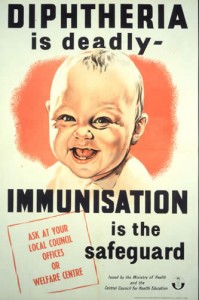

First it was Ebola, now it is the measles, not forgetting of course the annual debates about influenza. Of course I am talking about infectious diseases and the fact that every once in a while they become front-page news. Inevitably, the conversation quickly shifts to those among us who choose not get vaccinated or have their children vaccinated. While I think that everyone should do everything they can to get vaccinated, I have to concede that some among us do not share that view. More importantly, we need get beyond labelling anyone who is reluctant to embrace vaccination as an ‘anti-vaxxer’. The common account of a so-called anti-vaxxer is very negative indeed. These people are described as a bit nutty, reject the benefits of modern science and are thought by many to be the functional equivalent of folks who think the moon landing was a hoax or that the theory of evolution should be disregarded or who think Elvis still walks among us. This view is wrong.
A recent three-part series in Forbes magazine (you can find the first instalment here) offers a nuanced and effective argument that it is a mistake to think of our fellow citizens who are not as enthusiastic about vaccination as a single group of crazy people. To take but one example, parents who are reluctant to have their children vaccinated may not reject the basic idea of vaccination. Rather, they may be concerned about the absolute number of vaccines that are recommended be administered to their children in a short period of time. While the scientific evidence suggests there is minimal risk associated with the current vaccine schedule, it is critical to remember that these parents are acting out of deep felt and genuine concern for their kids. Similarly, the series does a good job of explaining that if we are to convince people who are opposed to vaccines to change their minds, shaming them is not a good idea. It is also more complicated than simply confronting them with the science. As the political scientist, Brendan Nyhan has suggested, « Current public health communications about vaccines may not be effective. For some parents, they may actually increase misperceptions or reduce vaccination intention. Attempts to increase concerns about communicable diseases or correct false claims about vaccines may be especially likely to be counterproductive. » He has also done research that shows that for some people, corrective information that show that the flu vaccine does not give you the flu, can backfire. As he and his co-authors conclude, « respondents with high levels of concern about side effects were less likely to report that they would be immunized after seeing this information »
To put it differently, in order to talk about folks reluctant to vaccinate we need a better strategy, one that perhaps begins with a bit of empathy and a recognition that this is a conversation with a diverse group of people (of which only a tiny minority reject vaccination outright). In this vein a good place to start is a recent book by Eula Biss, On Immunity: An Inoculation. Biss is a professor of English and an essayist. She writes from the perspective of a new mother who struggled to do what is right for her children. She is a strong supported of vaccination but in the book she describes her efforts to understand other new parents who, in an attempt to do what they think is best for their children, take a more critical stance. Hers is an empathetic approach which, while critical of parents who do not choose to vaccinate their children, tries to respect and understand the many reasons why not all of us are enthusiastic about vaccination.
Photo by Sanofi Pasteur and Eric Larrayadieu / CC BY-NC 2.0 / modified from original








